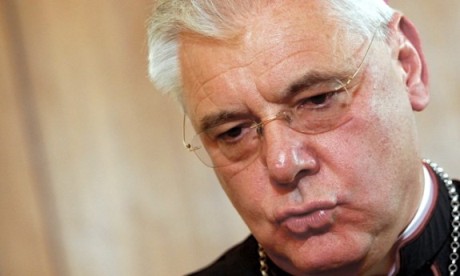The Vatican’s doctrine chief has told the leaders of 40,000 United States women religious that they are in danger of moving away from the Christian faith and the Church.
In Rome on April 30, Cardinal Gerhard Müller objected to a growing “focus of attention” within the Leadership Conference of Women Religious on a concept called “cosmic evolution”.
Cardinal Müller, the prefect of the Congregation for the Doctrine of the Faith, likened this to the ancient heresy of Gnosticism.
Two years ago, a keynote speaker at LCWR’s annual conference was a leading thinker on conscious evolution, Barbara Marx Hubbard.
Since that address, Cardinal Müller said, “every issue of your newsletter has discussed conscious evolution in some way”.
Its concepts have been found in the directional statements of religious institutes, he complained.
Cardinal Müller said the fundamental theses of conscious evolution are “opposed to Christian Revelation”.
He said he was worried an uncritical acceptance means a “de facto” movement “beyond the Church and sound Christian faith has already occurred”.
Cardinal Müller also challenged the LCWR leaders for bestowing a 2014 Outstanding Leadership Award to “a theologian criticised by the Bishops of the United States because of the gravity of the doctrinal errors in that theologian’s writings”.
Although he does not name her, Cardinal Müller was referencing Sr Elizabeth Johnson, a theologian at Fordham University.
He called this an “open provocation” against the Holy See.
The Vatican is insisting that speakers and presenters at the sisters’ major programmes be approved by its “archbishop delegate” to the LCWR.
In 2012, the Vatican appointed Archbishop Peter Sartain to this position and gave him authority to revise the LCWR’s statutes and programmes.
There is also an ongoing doctrinal assessment of the group.
Past LCWR leaders have said the Vatican’s sanctions are disproportionate and compromise the organisation’s ability to fulfill its mission.
Cardinal Müller concluded: “At this phase of the implementation of the doctrinal assessment, we are looking for a clearer expression of . . . ecclesial vision and more substantive signs of collaboration.”
An LCWR statement noted that the discussion that followed the prefect’s address was “an experience of dialogue that was respectful and engaging”.
Sources
